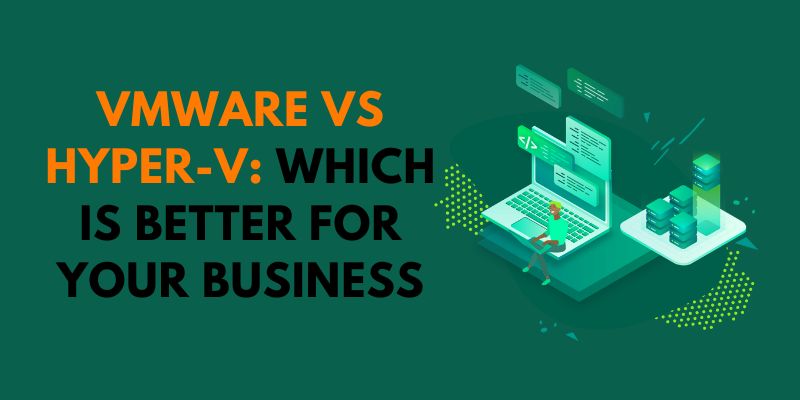Virtualization technology has gained acceptance among many firms and organizations in recent years because it allows a single unit of computer hardware to be shared among numerous virtual machines. In this way, virtualization helps reduce the large cost of equipment and resources while improving working productivity. Regardless of whether your company has implemented this technology, evaluating virtualization technology in working circumstances is critical. To learn more about VMware development, join the VMware Training Institute In Chennai at FITA Academy, which will provide you with a diverse skill set and the best Placement Training.
A hypervisor is a piece of computer software, firmware, or hardware that builds and manages virtual computers. Currently, two major hypervisors dominate the virtualization market: Hyper-V and VMware.
This blog will explain Hyper-V, VMware, and VMware vs Hyper-V: Which is Better for your Business.
What is VMware?
In the 1990s, VMware proposed virtualization technology. The ESX/ESXi bare metal hypervisor for x86 architecture serves as the foundation of the virtualization technology technique. Multiple virtual machines (VM) can be run on the hypervisor. It can share resources like CPU, RAM, and network ports from the same physical server.
By using VMware, you must keep the advantages
Advantages of VMware
- Well-established, proven technology.
- Enterprise leader in data centre virtualization.
- Continuing to innovate.
What is Hyper-V?
Hyper-V is virtualization software that allows you to run multiple operating systems (OS) on a single machine. It provides a virtualization foundation on which to create IT infrastructure of any complexity.
In Hyper-V, there is one evident partition and numerous child partitions. The primary operating system is installed in the parent partition. Each child partition is a virtual machine or an entire virtual computer with a guest operating system and programmes. The virtual machines use the same hardware as the host. Many VMs can be built on a single Hyper-V host.
You should be aware of the following Hyper-V benefits:
Advantages of Hyper-V
- It is dedicated to improving the hypervisor and is backed by Microsoft.
- Runs Microsoft’s Azure public cloud, which is being tried and tested daily.
- The Microsoft ecosystem is widely used in the enterprise market.
- Enterprise licence agreements help customers.
Hyper-V vs VMware: What Are the Differences
Both Hyper-V and VMware have several characteristics that set them apart from one another. Furthermore, when picking between the two virtualization platforms, there are more advantages and downsides to consider.
Enroll in the VMware Course In Chennai, Which will provide you with more Concepts about VMware Business Techniques.
Let’s make a comparison based on the following criteria:
- Supported Operating Systems
- Security
- Scalability
- Networking
- Price
Supported Operating Systems
The entire aim of the hypervisor’s capabilities in virtualization is to run guest operating systems. Let’s compare Hyper-V and VMware regarding operating systems supported by each hypervisor.
Hyper-V
In addition to Windows operating systems, Hyper-V can support:
- CentOS
- Red Hat Enterprise Linux
- Debian
- Oracle Linux
VMware
VMware now supports the following new guest operating systems:
- Asianux 4 SP4
- Solaris 11.2
- Ubuntu 12.04.5
- Ubuntu 14.04.1
Security
Hyper-V also has strong security measures. VMware, on the other hand, is an enterprise-grade virtualization solution with naturally more powerful security measures.
Hyper-V
Encrypted networks. It is a feature in Windows Server 2019 that provides encryption for all traffic on the whole subnet. Virtual machines or network equipment do not need to be configured or changed.
Guarded Fabric. It is a security concept that assists hosts and their virtual machines avoid dangerous software. It can also operate three standard VMs with no protection, encryption-supported VMs, and shielded VMs with non-disableable protection.
VMware
Host-level security capabilities. CPU isolation, memory isolation, device isolation, lockdown mode, certificate replacement, and smart card authentication are all supported by ESXi.
Host firewall. ESXi hosts are protected by a firewall, which denies access to services and ports save for a few critical ports by default.
Networking
Microsoft Hyper-V offers networking through Windows Server. Virtualized networking features in Windows Server include:
- Layer 2 network virtualization.
- Gateways route traffic across virtual networks or between physical and virtual networks.
For virtualized networking, VMware offers NSX-T, which has the following features:
- Layer 2, Layer 3, and isolated virtual networks are all examples of virtual networks.
- L2VPNs allow on-premises subnets to be extended to the virtualized environment without changing IP addresses.
Conclusion
Hopefully, you enjoyed this blog and now understand everything about VMware, including VMware vs Hyper-V: Which is Better for your Business.
You can gain more expertise and ability in designing dynamic and interactive web applications by studying at the VMware Training Center Chennai at FITA Academy.

